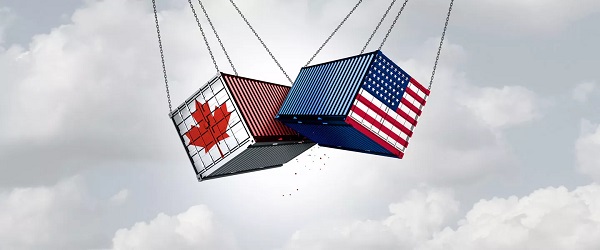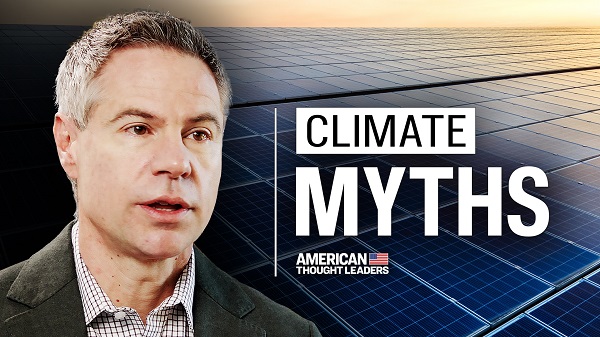Business
Trade retaliation might feel good—but it will hurt Canada’s economy

From the Fraser Institute
To state the obvious, president-elect Donald Trump’s threat to impose an across-the-board 25 per cent tariff on Canadian exports to the United States has gotten the attention of Canadian policymakers who are considering ways to retaliate.
Reportedly, if Trump makes good on his tariff threat, the federal government may levy retaliatory tariffs on a wide range of American-made goods including orange juice, ceramic products such as sinks and toilets, and some steel products. And NDP Leader Jagmeet Singh said he wants Canada to block exports of critical minerals such as aluminum, lithium and potash to the United States, saying that if Trump “wants to pick a fight with Canada, we have to make sure it’s clear that it’s going to hurt Americans as well.”
Indeed, the ostensible goal of tariff retaliation is to inflict economic damage on producers and workers in key U.S. jurisdictions while minimizing harm to Canadian consumers of products imported from the U.S. The hope is that there will be sufficient political blowback from Canada’s retaliation that Republican members of Congress will eventually view Trump’s tariffs as an unacceptable risk to their re-election and pressure him to roll them back.
But while Canadians might feel good about tit-for-tat retaliation against Trump’s trade bullying and taunting, it might well make things worse for the Canadian economy. For example, even selective tariffs will increase the cost of living for Canadians as importers of tariffed U.S. goods pass the tax along to domestic consumers. Retaliatory tariffs might also harm productivity growth in Canada by encouraging increased domestic production of goods that are produced relatively inefficiently here at home compared to in the U.S. Make no mistake—once trade protections are put in place, the beneficiaries have a strong vested interest in having the protections maintained indefinitely. While Trump will be gone in four years, tariffs imposed by Ottawa to retaliate against his actions will likely remain in place for longer.
The U.S. president has substantial leeway under existing legislation to implement trade measures such as tariffs. While Trump has several legislative options to impose new tariffs against Canada and Mexico, he’ll likely use the International Emergency Powers Act (IEEPA), which grants the president power to regulate imports and impose duties in response to an emergency involving any unusual and extraordinary threat to national security, foreign policy or the economy. According to Trump’s rhetoric, the emergency is illegal immigration and drug traffic originating in Canada and Mexico.
However risible Trump’s emergency claim might be when applied to Canada, overturning any action under the IEEPA, or some other enabling legislation, would require a legal challenge. And in fact, because no president has yet used the IEEPA to impose tariffs, the legality of Trump’s actions remains in doubt. In this context, a group of governors sympathetic to Canada’s position (and their own political fortunes) might spearhead a legal challenge to Trump’s tariffs with encouragement and support from the Canadian government.
To be sure, any legal challenge would take time to work its way through the U.S. court system. But it will likely also take time for domestic opposition to Trump’s tariffs to gain sufficient political momentum to effect any change. Indeed, given the current composition of Congress, it’s far from clear that a Team Canada effort to rally broad anti-tariff support among U.S. politicians and business leaders would bear fruit while Trump is in office.
While direct retaliation might be emotionally satisfying to Canadians, it would likely do more economic harm than good. And while a legal challenge will not obviate the immediate economic harm Canada will suffer from Trump’s tariffs, it might help limit the ability of Trump (and any future president) to use trade policy for political leverage in our bilateral relationship. After all, there’s no guarantee that the next president will not be a Trump acolyte.
Business
Mark Carney Seeks to Replace Fiscal Watchdog with Loyal Lapdog

After scathing warnings from interim budget officer Jason Jacques, Liberals move to silence dissent and install a compliant insider with “tact and discretion.”
It’s remarkable, isn’t it? After a decade of gaslighting Canadians about their so-called “fiscally responsible” governance, the Liberal Party, now under the direction of Mark Carney, finally runs into a problem they can’t spin: someone told the truth. Jason Jacques, the interim Parliamentary Budget Officer, was appointed for six months, six months. And within weeks, he did something this government considers a fireable offense: he read the books, looked at the numbers, and spoke plainly. That’s it. His crime? Honesty.
Here’s what he found. First, the deficit. Remember when Trudeau said “the budget will balance itself”? That myth has now mutated into a projected $68.5 billion deficit for 2025–26, up from $51.7 billion the year before. Jacques didn’t just disagree with it. He called it “stupefying,” “shocking,” and, this is the one they hate the most, “unsustainable.” Because if there’s one thing Ottawa elites can’t handle, it’s accountability from someone who doesn’t need a job after this.
But Jacques didn’t stop there. He pointed out that this government has no fiscal anchor. None. Not even a fake one. A fiscal anchor is a target, like a deficit limit or a falling debt-to-GDP ratio—basic stuff for any country pretending to manage its money. Jacques said the Liberals have abandoned even that pretense. In his words, there’s no clear framework. Just blind spending. No roadmap. No compass. No brakes.
And speaking of GDP, here’s the kicker: the debt-to-GDP ratio, which Trudeau once swore would always go down, is now heading up. Jacques projects it rising from 41.7% in 2024–25 to over 43% by 2030–31. And what happens when debt rises and growth slows? You pay more just to service the interest. That’s exactly what Jacques warned. He said the cost of carrying the debt is eating into core government operations. That means fewer services. Higher taxes. Slower growth. The burden gets passed to your children while Mark Carney gives another speech in Zurich about “inclusive capitalism.”
And let’s talk about definitions. Jacques flagged that the Liberals are now muddying the waters on what counts as operating spending versus capital spending. Why does that matter? Because if you redefine the terms, you can claim to be balancing the “operating budget” while secretly racking up long-term debt. It’s accounting gimmickry, a shell game with your tax dollars.
He also pointed to unaccounted spending, about $20 billion a year in campaign promises that haven’t even been formally costed yet. Add that to their multi-decade defense commitments, green subsidies, and inflated federal payroll, and you’re looking at an avalanche of unmodeled liabilities.
And just to make this circus complete, Jacques even criticized the way his own office was filled. The Prime Minister can handpick an interim PBO with zero parliamentary input. No transparency. No debate. Just a quiet appointment, until the appointee grows a spine and tells the public what’s really going on.
Now the Liberals are racing to replace Jacques. Why? Because he said all of this publicly. Because he didn’t play ball. Because his office dared to function as it was intended: independently. They’re looking for someone with “tact and discretion.” That’s what the job listing says. Not independence. Not integrity. Tact. Discretion. In other words: someone who’ll sit down, shut up, and nod politely while Carney and Champagne burn through another $100 billion pretending it’s “investment.”
Let’s be clear: this isn’t just about replacing a bureaucrat. It’s about neutering the last shred of fiscal oversight left in Ottawa. The Parliamentary Budget Officer is supposed to be a firewall between reckless political ambition and your wallet. But in Carney’s Canada, independence is an inconvenience. So now, instead of extending Jacques’ term, something that would preserve continuity and show respect for accountability, the Liberals are shopping for a compliant technocrat. Someone who won’t call a $68.5 billion deficit “stupefying.” Someone who’ll massage the numbers just enough to keep the illusion intact.
They don’t want an economist. They want a courtier. Someone with just enough credentials to fake credibility, and just enough cowardice to keep their mouth shut when the spending blows past every so-called “anchor” they once pretended to respect. That’s the game. Keep the optics clean. Keep the watchdog muzzled. And keep Canadians in the dark while this government drives the country off a fiscal cliff.
But let me say it plainly, thank god someone in this country still believes in accountability. Thank God Jason Jacques stepped into that office and had the guts to tell the truth, not just to Parliament, but to the Canadian people. And thank God Pierre Poilievre has the common sense, the spine, and the clarity to back him. While Mark Carney and his Laurentian elite pals are busy gutting oversight, rewriting the rules, and flooding the economy with borrowed billions, it’s men like Jacques who refuse to play along. He looked at the books and didn’t see “investment”—he saw a ticking fiscal time bomb. And instead of ducking, he sounded the alarm.
Poilievre, to his credit, is standing firmly behind the man. He understands that without a real watchdog, Parliament becomes a stage play, just actors and scripts, no substance. Backing Jacques isn’t just good politics. It’s basic sanity. It’s the minimum standard for anyone who still thinks this country should live within its means, tell the truth about its finances, and respect the people footing the bill.
So while the Liberals scramble to muzzle dissent and hire another smiling yes-man with a resume full of buzzwords and a Rolodex full of Davos invites, at least one opposition leader is saying: No. We need a watchdog, not a lapdog. And in a city full of spineless bureaucrats, that’s not just refreshing—it’s absolutely essential.
Subscribe to The Opposition with Dan Knight .
For the full experience, upgrade your subscription.
Business
Sluggish homebuilding will have far-reaching effects on Canada’s economy

From the Fraser Institute
At a time when Canadians are grappling with epic housing supply and affordability challenges, the data show that homebuilding continues to come up short in some parts of the country including in several metro regions where most newcomers to Canada settle.
In both the Greater Toronto area and Metro Vancouver, housing starts have languished below levels needed to close the supply gaps that have opened up since 2019. In fact, the last 12-18 months have seen many planned development projects in Ontario and British Columbia delayed or cancelled outright amid a glut of new unsold condominium units and a sharp drop in population growth stemming from shifts in federal immigration policy.
At the same time, residential real estate sales have also been sluggish in some parts of the country. A fall-off in real estate transactions tends to have a lagged negative effect on construction investment—declining home sales today translate into fewer housing starts in the future.
While Prime Minister Carney’s Liberal government has pledged to double the pace of homebuilding, the on-the-ground reality points to stagnant or dwindling housing starts in many communities, particularly in Ontario and B.C. In July, the Canada Mortgage and Housing Corporation (CMHC) revised down its national forecast for housing starts over 2025/26, notwithstanding the intense political focus on boosting supply.
A slowdown in residential construction not only affects demand for services provided by homebuilders, it also has wider economic consequences owing to the size and reach of residential construction and the closely linked real estate sector. Overall, construction represents almost 8 per cent of Canada’s economy. If we exclude government-driven industries such as education, health care and social services, construction provides employment for more than one in 10 private-sector workers. Most of these jobs involve homebuilding, home renovation, and real estate sales and development.
As such, the economic consequences of declining housing starts are far-reaching and include reduced demand for goods and services produced by suppliers to the homebuilding industry, lower tax revenues for all levels of government, and slower economic growth. The weakness in residential investment has been a key factor pushing the Canadian economy close to recession in 2025.
Moreover, according to Statistics Canada, the value of GDP (in current dollars) directly attributable to housing reached $238 billion last year, up slightly from 2023 but less than in 2021 and 2022. Among the provinces, Ontario and B.C. have seen significant declines in residential construction GDP since 2022. This pattern is likely to persist into 2026.
Statistics Canada also estimates housing-related activity supported some 1.2 million jobs in 2024. This figure captures both the direct and indirect employment effects of residential construction and housing-related real estate activity. Approximately three-fifths of jobs tied to housing are “direct,” with the rest found in sectors—such as architecture, engineering, hardware and furniture stores, and lumber manufacturing—which supply the construction business or are otherwise affected by activity in the residential building and real estate industries.
Spending on homebuilding, home renovation and residential real estate transactions (added together) represents a substantial slice of Canada’s $3.3 trillion economy. This important sector sustains more than one million jobs, a figure that partly reflects the relatively labour-intensive nature of construction and some of the other industries related to homebuilding. Clearly, Canada’s economy will struggle to rebound from the doldrums of 2025 without a meaningful turnaround in homebuilding.
-

 espionage2 days ago
espionage2 days agoChinese-Owned Trailer Park Beside U.S. Stealth Bomber Base Linked to Alleged Vancouver Repression Case
-

 Daily Caller2 days ago
Daily Caller2 days agoLaura Ingraham Presses Trump On Allowing Flood Of Chinese Students Into US
-

 Crime2 days ago
Crime2 days agoCBSA Bust Uncovers Mexican Cartel Network in Montreal High-Rise, Moving Hundreds Across Canada-U.S. Border
-

 Environment2 days ago
Environment2 days agoThe Myths We’re Told About Climate Change | Michael Shellenberger
-

 MAiD1 day ago
MAiD1 day agoQuebec has the highest euthanasia rate in the world at 7.4% of total deaths
-

 COVID-192 days ago
COVID-192 days agoSpy Agencies Cozied Up To Wuhan Virologist Before Lying About Pandemic
-

 Business2 days ago
Business2 days agoCarney and other world leaders should recognize world’s dependence on fossil fuels
-

 Alberta12 hours ago
Alberta12 hours agoHow economic corridors could shape a stronger Canadian future








